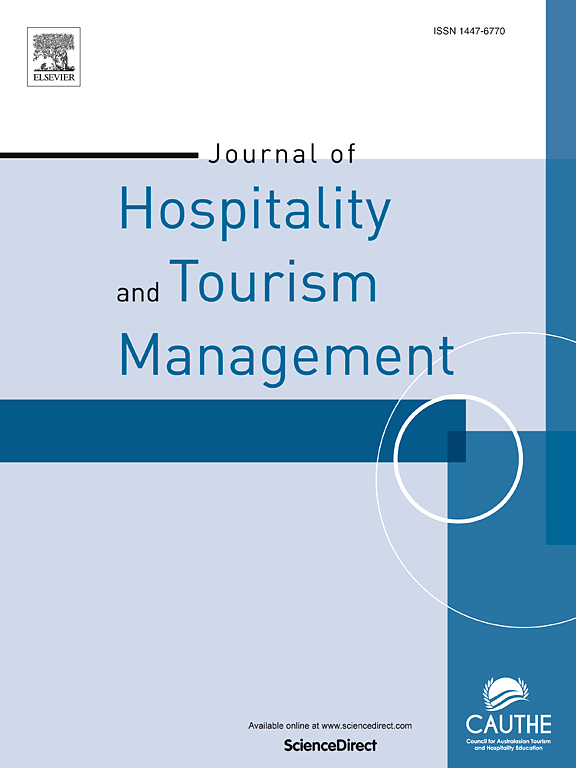Escapism as a driver of workcation: The roles of psychological ownership and motivation
IF 7.8
1区 管理学
Q1 HOSPITALITY, LEISURE, SPORT & TOURISM
引用次数: 0
Abstract
As digital technology advances and workplace flexibility expands, workcations have gained significant attention as a means to conserve occupational resources while enabling access to new psychological resources. Drawing on Conservation of Resources (COR) theory and psychological ownership theory, this study examines the role of escapism in motivating workcation intentions. Escapism, as a defensive evolutionary strategy, facilitates workcation by helping individuals avoid resource depletion and pursue psychological enrichment. The study further examines how utilitarian and hedonic motivations moderate this relationship. Through two online scenario-based surveys involving 300 and 120 participants, the findings show that escapism enhances workcation intentions by fostering psychological ownership, which is sequentially mediated by perceived control and self-expression. Additionally, utilitarian motivation strengthens the effect of escapism on psychological ownership. These findings contribute to theoretical advancements in hybrid travel behavior and offer practical insights for tourism and hospitality managers aiming to design workcation experiences that balance productivity, relaxation, and personal engagement.
逃避主义作为工作假期的驱动力:心理所有权和动机的作用
随着数字技术的进步和工作场所灵活性的扩大,工作假期作为一种节省职业资源同时获得新的心理资源的手段受到了极大的关注。利用资源保护理论和心理所有权理论,本研究探讨了逃避主义在激励工作动机中的作用。逃避主义作为一种防御性进化策略,通过帮助个体避免资源枯竭和追求心理充实来促进工作教育。该研究进一步探讨了功利动机和享乐动机如何调节这种关系。通过对300名和120名参与者的两项基于场景的在线调查,研究结果表明,逃避主义通过培养心理所有权来增强工作意向,而心理所有权是由感知控制和自我表达依次介导的。此外,功利动机强化了逃避主义对心理占有的影响。这些发现促进了混合旅行行为的理论进步,并为旨在设计平衡生产力、放松和个人参与的工作假期体验的旅游和酒店管理人员提供了实际见解。
本文章由计算机程序翻译,如有差异,请以英文原文为准。
求助全文
约1分钟内获得全文
求助全文
来源期刊
CiteScore
13.30
自引率
8.40%
发文量
177
审稿时长
45 days
期刊介绍:
Journal Name: Journal of Hospitality and Tourism Management
Affiliation: Official journal of CAUTHE (Council for Australasian Tourism and Hospitality Education Inc.)
Scope:
Broad range of topics including:
Tourism and travel management
Leisure and recreation studies
Emerging field of event management
Content:
Contains both theoretical and applied research papers
Encourages submission of results of collaborative research between academia and industry.

 求助内容:
求助内容: 应助结果提醒方式:
应助结果提醒方式:


